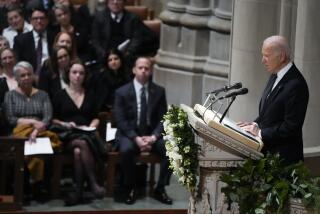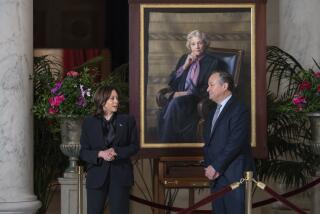School for Judges Marks 25th Year
- Share via
RENO — In its first quarter-century, the National Judicial College has taught about one-third of America’s judges how to judge.
Most of the 22,000 course graduates, including U.S. Supreme Court Justice Sandra Day O’Connor, completed the one- to four-week classes without incident.
But William B. Lawless, a former Notre Dame Law School dean who heads the judicial college here, chuckled as he recalled a 1971 ruse that landed five students--all judges--behind bars.
“Oh, it was wonderful; those were experimental times,” Lawless said. “We were trying everything to teach people the judicial process.”
The jurists were lured to a local bar and, as part of the scheme, propositioned by two young women. An angry man who also was in on the setup intervened and actually hit one of the startled judges in the stomach--twice.
All were arrested and jailed. It took several hours for the judges to figure out they were the butt of a college-sanctioned prank to introduce them to the other side of the bench.
‘Threatened to Sue’
“A couple of them threatened to sue us for false imprisonment,” said Lawless. “They dropped it, though. Yes, we have a checkered past.”
That occurred when the college was a mere 8 years old. This summer, the school celebrated its 25th anniversary in ceremonies at which Judge Joseph Wapner of television’s “People’s Court” presided.
The center was the inspiration of former U.S. Supreme Court Justice Tom Clark who founded the college in 1963 to fill a void.
As one former dean liked to say, “Law schools train lawyers. They don’t train judges.”
The college on the University of Nevada-Reno campus has 150 volunteer rotating instructors from across the nation, Lawless said. “We don’t just bring in lawyers and other judges to teach. We go out and find the experts who really know their subjects. A judge can always read a law book, but they get much more when they hear from the experts.”
Although none of the 1,600 who attend the National Judicial College each year faces jail any more, new judges usually begin with an intense four-week general jurisdiction course known as “boot camp.”
Earns Master’s Degree
“I went through that program in 1972, the first time I attended the judicial college and just after I was appointed to the bench,” said Circuit Court Judge Joseph Colquitt of Tuscaloosa, Ala., one of only three people to earn a master’s of judicial studies degree through the college and the university.
“It was tough but extremely valuable to a new judge because it touched on most of the issues judges have to deal with,” he said.
Colquitt also attended the college in 1975-76 and 1986-88, taking specialized courses finding application later.
In one case over which she presided, hospital attorneys argued that a woman would die without an operation. Colquitt ruled against the hospital and within 10 days the woman left her sick bed after doctors turned to alternative treatment.
“The last time I heard she was still walking around,” the judge said. “What I did in that case was rely on what I had learned about prevailing law in similar cases.
“In most jurisdictions you don’t come up against the unusual case. But every once in a while you do. Judges must be prepared, and I think the National Judicial College does that.”
More to Read
Sign up for Essential California
The most important California stories and recommendations in your inbox every morning.
You may occasionally receive promotional content from the Los Angeles Times.













